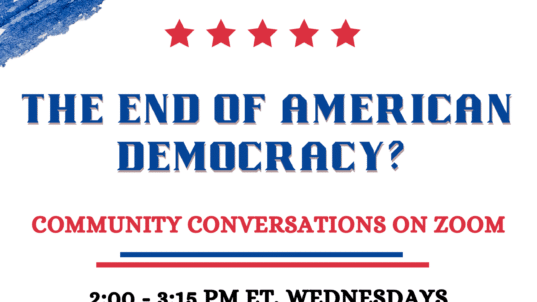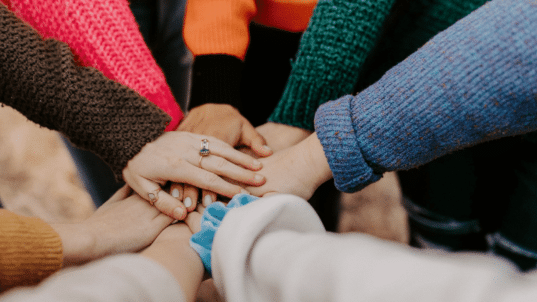Exploring Democratic Citizenship
What does it mean to participate in a democracy–to be a “democratic citizen”? What questions or concerns do you have about participation in our democracy? Those questions were the focus of the first of our four “What IF?–Online Community Conversations” under the heading of “Toward a More Perfect Union.” Below you’ll find a summary of the core points that emerged during the discussion.
Please join our second event on February 10th at 4pm-5:15 pm ET. We’ll be exploring the role of information in a democracy. What concerns and challenges come to mind when you think about the role of information in a healthy democratic society? We’ll dive in on that question and more, especially as we think about issues concerning the quality of information and the different ways we might get information as citizens in a democracy. Our discussions are participatory, exploratory, and collaborative. You can register here for this free event.
What are different aspects of democratic participation—or democratic citizenship?
- Being an active participant in your community—anything that builds community
- Participating in, or supporting, community organizations or initiatives (volunteering, donating, etc.)
- Serving on governing boards or committees (e.g. neighborhood associations, library board)
- Participating in deliberative or planning exercises (e.g. neighborhood planning, participatory budgeting)
- Engaging in community organizing
- Engaging with your community and acting with compassion, are key to living a purposeful life, which can keep you and the community healthier
- Engaging in public service, like joining the armed services, serving in government, running for elected office
- Making your voice heard and listening to others on public matters
- Participating in discussions large and small, formal (like this one!) and informal
- Listening to others, seeking out diverse perspectives and trying to learn from them
- Expressing yourself in public forums (letter to the editor, social media post, town hall meeting, etc.)
- Advocating for public issues, petitioning the government, etc.
- Protesting
- Being a voter, taking part in elections and referenda
- Civic education
- Educating and learning about public matters
- Having access to reliable information
- Learning to differentiate true and false information, helpful or harmful ideas
- Educating and learning about governance processes, how our system can work
- Developing the critical ability to think through and make your own political judgments
- Cultivating the beliefs and values to sustain healthy self-governance:
- Openness to change: democracy is living, constantly changing
- Spirit of cooperation and compromise
- Mutual respect for others
- Trust and optimism in the process
- A friendly spirit of interdependence, being in this together
- Practicing healthy give-and-take in families and with peers as part of civic education
- Equal rights to participate in the activities of a self-governing society
- Citizens should have these rights equally, with equal representation (one person, one vote)
- Greater inclusion fosters more democratic participation, exclusion less
- Responsibilities of democratic citizens to participate in activities of self-governing (“what can you do for your country?”)
- Look for ways to be actively engaged in the life of the community, of society
- Look for ways to improve things
- Educate yourself on the issues
- Share information and ideas that are good and helpful, not false and harmful
- Serve when called (jury duty, military, taxes)
- Learn to cooperate with others and be open to compromise
Questions and Concerns about Democratic Participation
- How might we expand opportunities for democratic participation in a large and diverse society?
- How can we address concerns about equity in democratic participation, especially given our history of racism in the restriction of rights of participation?
- How can we address concerns that moves for greater equity might encourage backlashes?
- Concerns that steps toward equity can be felt as a loss in status for those who have been on top
- How might we address intentional barriers to democratic participation?
- Concerns about rampant partisan voter suppression efforts, partisan gerrymandering, etc.
- Concerns about racially-motivated suppression of democratic participation
- How might we address structural impediments to democratic participation?
- Concerns about the anti-majoritarian and inequitable aspects of our system: the electoral college, the senate, etc.
- Concerns about our two-party system and the way that limits and discourages participation
- How can we help make government more responsive to the will of the people?
- What might be the benefits or drawbacks for more direct democracy (referenda) versus representative democracy?
- Direct democracy could empower more citizens to express their policy preferences
- What happens when citizens lack the information they need to make these choices—or are subject to disinformation campaigns?
- Concerns about population size and one’s voice—how to be heard and hear others when population sizes are so large
- How might we address economic barriers to participation?
- Poverty, low wages, and restrictive work hours block participation for many
- Mobility obstacles impede access to participation (e.g. car-centric development as an obstacle to getting to the polling site)
- To have a healthy democracy, do we need to foster a stronger middle class?
- How might we address the relation of money and democracy?
- Concerns that the system is rigged for the interests of corporations and the wealthy, discouraging participation by the majority of citizens
- What could or should be the relationship of capitalism and democracy?
- What could or should be the role of corporations in a democracy (being a good “corporate citizen”)?
- How might we address cultural and linguistic barriers for participation in a diverse society?
- How might we foster a culture of democratic participation?
- How do we foster or restore a sense of trust and hope in democratic governance—that it’s acting in the interest of the people and not of special interests?
- How do we re-engage people who have grown disconnected from the democratic system?
- Address the cultural sentiment that my voice/vote doesn’t count
- How do we address the free-rider problem and get more citizens to participate?
- How do we cultivate a spirit of cooperation and compromise among citizens and among political representatives?
- How do we make sure all people feel included, feel welcome and able to participate in activities of democratic participation?
- How can we encourage more patience for change, since collaboration takes time?
- How can we address cultural or psychological barriers, like intimidating those who dissent or stand out from the status quo?
- How might we best carry out and support civic education for democratic participation?
- Concern for good civics education for all ages—for good participatory practices, for the know-how to be an engaged democratic citizen
- How can we make it easier for all to get reliable information about the issues or candidates?
- Educate citizens to live up to the responsibilities and rights of democratic participation
- Educate citizens to critically evaluate information and ideas—combating dis- or misinformation
- Educate people for the skills necessary for democracy, like the ability to seek compromises and reconcile different interests
- In a democracy with free speech and free press rights, how should we address the problem of dis- and misinformation?
- Addressing concerns about the quality of information
- Concerns for the promise of social media to enable more people to have a voice and to hear from more people
- Concerns about social media as major distributor of false information or harmful ideas
- What role should expertise play in democracy—especially in relation to the role of average citizens?
- How might we balance concerns for supporting the right to protest with concerns about potential disorder and violence?
- Protest by nature will be disruptive; how do we balance concerns for free expression while preventing violence?




